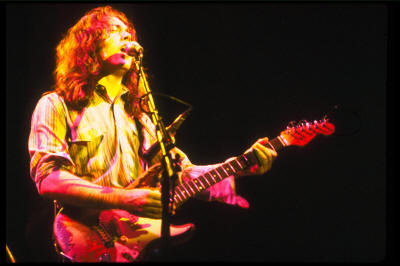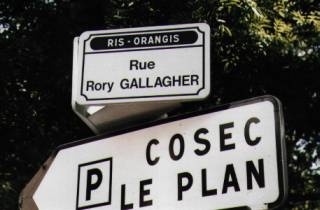Aidan Curran posted on September 05, 2007 14:42
About twenty minutes from Paris by train, going south-east and up the Seine, there’s a town called Ris-Orangis. Sadly, it doesn’t live up to its evocative name; there are no orange groves or rice plantations - just grey motorways and peeling tower blocks. But when we went there it was not in search of a paddy field but a Paddy-street.
Like looking for Willie McBride's grave in 'The Green Fields Of France', after walking across this dusty town in the scouring sunshine for most of an hour (one cobbled road en route had literally been taken up), eventually discovering that another train station is much closer, we found it.
Welcome to Rue Rory Gallagher.
 At first sight, considering the trek it takes to get there, it’s a bit of a let-down. You won’t find a tree-lined boulevard or bluesy back-alley; Rue Rory Gallagher is a drab dead-end road* running through a small industrial zone. It’s not attractively-planned or picturesque – the end of the road leads on to unused ground.
At first sight, considering the trek it takes to get there, it’s a bit of a let-down. You won’t find a tree-lined boulevard or bluesy back-alley; Rue Rory Gallagher is a drab dead-end road* running through a small industrial zone. It’s not attractively-planned or picturesque – the end of the road leads on to unused ground.
Around the corner is a large secondary school, so in the afternoons straggling teenagers traipse along it as a short cut to the nearby train station of Orangis Bois de l’Epine (the one we should have used). There’s no café or bar where you can sit down, get a drink and contemplate Rory – or even a shop to buy a choc-ice (it was a REALLY hot afternoon).
Basically, it’s no tourist attraction - the Rory Gallagher corners, squares and so forth across Ireland easily beat their French namesake in the picture-postcard stakes.
But why did this Paris satellite town name one of its backroads after an Irishman with no obvious French connection? Well, among the windowless warehouses and small factories on this street there’s a music venue called Le Plan – and it was here that Gallagher played his last French concert, in 1995 – just months before he died in June of that year.
 Such was Rory’s popularity in France that immediately after his death local music fans moved to have the road outside the venue named after him. The local council promptly agreed and so, before Ballyshannon or Dublin or Cork got round to it, an unremarkable French town marked his memory and music. Rory’s brother Donal, keeper of the flame, and their mother Monica attended the unveiling of the new street-name in October 1995. An information panel outside Le Plan explains Gallagher’s life and work for any curious passers-by. Unfortunately, the panel tends to get pasted over with flyers for forthcoming shows.
Such was Rory’s popularity in France that immediately after his death local music fans moved to have the road outside the venue named after him. The local council promptly agreed and so, before Ballyshannon or Dublin or Cork got round to it, an unremarkable French town marked his memory and music. Rory’s brother Donal, keeper of the flame, and their mother Monica attended the unveiling of the new street-name in October 1995. An information panel outside Le Plan explains Gallagher’s life and work for any curious passers-by. Unfortunately, the panel tends to get pasted over with flyers for forthcoming shows.
On reflection, maybe the location is fitting – after all, factory-workers and schoolkids seem like exactly the sort of audience (or ‘demographic’, in today’s less-romantic term) that a bluesman would have wanted. There’s a live music venue there too, of course – and a train line** nearby; how blues is that?
And that waste ground at the end of the street has grown into a lush green meadow, natural and untended. This globetrotting and widely-loved musician has as a memorial a corner of a foreign field that is forever Ireland.
* The French don’t say ‘cul-de-sac’ and look at you funny if you do – it just means ‘the arse of a bag’; the French term is 'impasse'. In fact, there's another French dead-end street named after Rory; the Impasse Rory Gallagher in the southern town of Bedoin, near Mont Ventoux (infamous for the death of British cyclist Tom Simpson during the 1967 Tour de France).
** To get from Paris to Rue Rory Gallagher in Ris-Orangis by train, take the RER D (branch D4) from either Châtelet or Gare de Lyon. Make sure you take a train that stops at Orangis Bois de l’Epine – the station at Ris-Orangis is an hour’s walk away and on a different spur of the same line. From the station at Orangis Bois de l’Epine it’s just a five minute walk along a path through a field, bearing right towards some low warehouse-type buildings. You’ll come to some concrete bollards that mark the end of Rue Rory Gallagher; the street-sign is at the other end.
More ...
[Read more...]